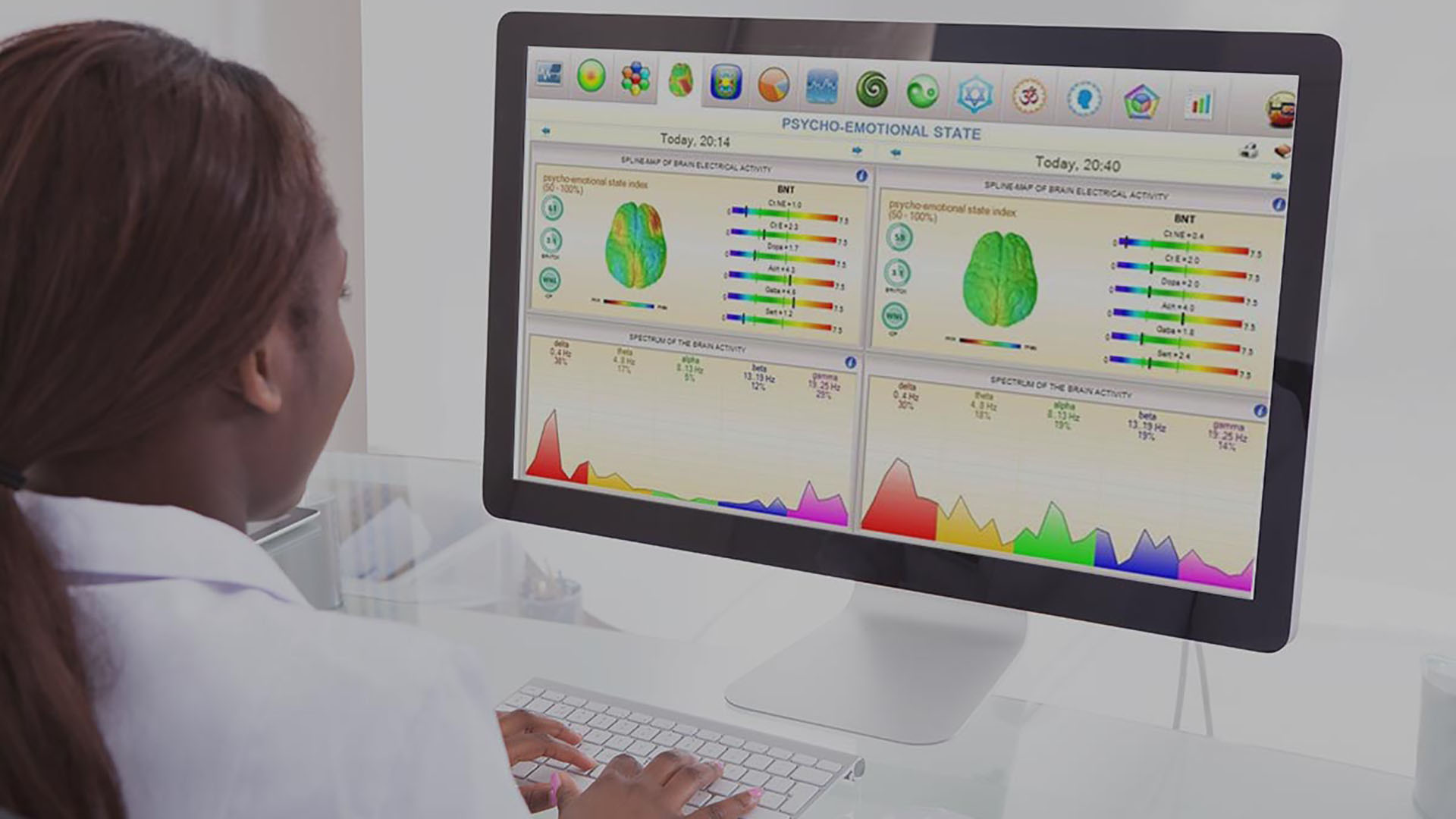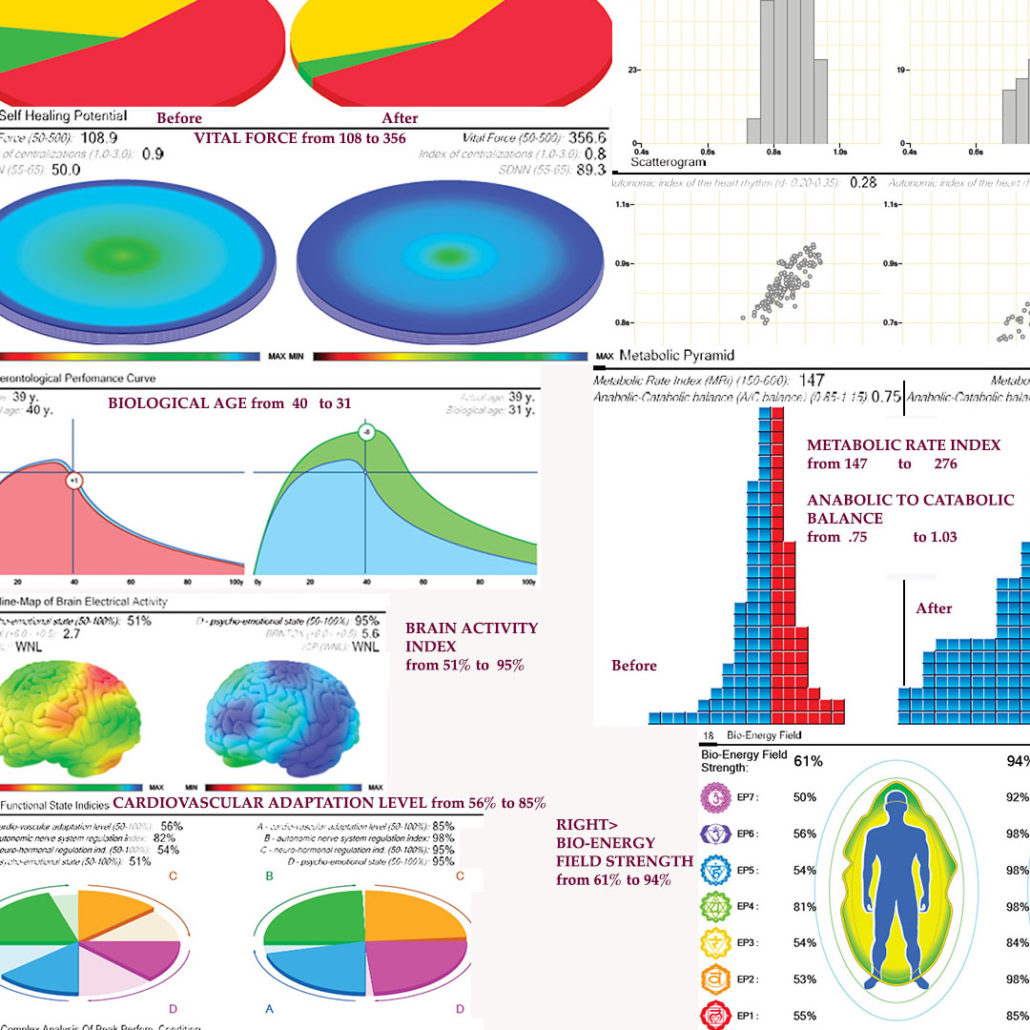HeartQuest
An advanced diagnostic system that monitors heart rate variability (HRV) and analyzes the human biorhythms and regulatory systems.

An advanced diagnostic system that monitors heart rate variability (HRV) and analyzes the human biorhythms and regulatory systems.
HeartQuest (HQ) is an advanced, non-invasive, evaluation system that monitors the heart rate (heart rate variability or HRV) and analyzes the human biorhythms and regulatory systems. This computerized system allows healthcare practitioners of any field to quickly monitor the rhythmic patterns of the heart rate by extracting data from an electro-cardio signal in the broadband frequency. It also enables practitioners to objectively look into the many regulatory systems of the body and see firsthand the effects of their therapies and treatment.
Today, more patients struggle with complex, chronic conditions that are very difficult to treat. Practitioners often have to use multiple modalities to improve their patients’ health. It is extremely difficult to measure the progress, and the HeartQuest diagnostic system helps to measure if the patients’ conditions are improving or not.
HQ is used to follow indices of the autonomic nervous system, neurohormonal system, psycho-emotional state, brain electrical activity, meridians, and chakras in relation to the endocrine system. It analyzes the intricate web of interconnections regulating our highly complex physiology.
Clinical experience has shown that HeartQuest may be used to review a number of health parameters and that the benefits include assessment of the following:
Heart rate variability (HRV) is the physiological phenomenon of variation in the time interval between heartbeats. It is measured by the variation in the beat to beat intervals. A healthy heart rate variability is reflected by lots of variation in the time domain between successive heartbeats. This would indicate a very robust autonomic nervous system. Someone with less variation between one heartbeat to the next has low heart rate variability and indicates decreased autonomic nervous system regulation. The importance of heart rate variability is that it is controlled by the autonomic nervous system and therefore is a window into its function. The autonomic nervous system (composed of the sympathetic nervous system and parasympathetic nervous system) automatically influences the visceral organs, smooth muscle such as the blood vessels and glands and obviously a big influence on the heart.
The second component of heart rate variability besides the time domain is the spectral analysis. The ECG is broken down into very specific frequency bandwidths that correspond to specific functions. Low frequency, for example, has to do with the sympathetic nervous system and high frequency has to do with parasympathetic nervous system function. Within these various frequencies, bandwidths are the proprietary information unique to the HeartQuest that can inform practitioner information about meridians and other systems of the body that other heart rate variability technologies lack.
The HeartQuest diagnostic system analyzes the intricate web of interconnections regulating our highly complex physiology. It also has an educational biofeedback balancing program that is customized for the patient. In other words, with HeartQuest heart rate variability monitoring, one can discover how stress may be affecting the nervous system or cardiovascular system, and by extension-specific individual markers as well as overall health. In addition, the HeartQuest system goes beyond measuring only heart rate variability – it also determines the status of the neuro-hormonal system, brain waves, biorhythms and circadian rhythms, meridians and chakras, and overall vital force. Finely detailed and designed data displays are able to be shared with the patient in a simple to read manner, and HeartQuest is often utilized along with other evaluation methods as a supplemental diagnostic for the patient.

“HRV is a reflection of the autonomic nervous system, which controls 90% of the body’s functions…advanced HRV can reflect our evolutionary biology and where we are today, in terms of our ability to adapt to multiple stressors. This specialized HRV gives us a quantitative view of our adaptive capabilities and predicts how all of our regulatory systems are working inside or outside a specific zone.”
MICHAEL KESSLER DC, CCSP
For centuries, physicians have used the pulse as a diagnostic tool to measure the functions of various organs. Now, after 25 years of research by Russian scientists, HeartQuest can analyze the changes in HRV by measuring the duration of each heart cycle, which ultimately provides important data on how well an individual’s internal organs and bodily systems are functioning.
While significant clinical research is lacking for HeartQuest specifically, the importance of monitoring Heart rate variability (HRV) has been well established. The last 4 decades have witnessed the recognition of a significant relationship between the autonomic nervous system and cardiovascular mortality.
source: Heart rate variability, Standards of measurement, physiological interpretation, and clinical use, European Heart Journal, 1996
Research coming out of Russia includes some very provocative studies on the use of HRV to assess thyroid balance or imbalance, to indirectly evaluate brain function, to obtain very accurate information about Chinese meridians, and more.
source: Heart Rate Variability – The Why, What, and How of HRV and Its Importance in Private Practice, Naturopathic Doctor News and Review, 2014
At the New York Center of Innovative Medicine, HeartQuest is one of the numerous evaluation systems utilized for each patient. Together with other tests and systems, identification of root causes as well as a personalized program of treatment can be created to best fit you. The ultimate goal is the complete restoration of health in the most efficient and safe manner, and with so many therapeutic options, HeartQuest along with other advanced systems will be performed at your initial evaluation at our clinic.
Contact NYCIM and Book Your Appointment Today
or
» Take Our Questionnaire to See if You’re a Good Candidate
or
» See Additional NYCIM Services & Therapies
Innovative Medicine is about restoring your body and mind’s power to heal itself. Learn how to tap into your unique healing potential by signing up for our newsletter.

 Halo Therapy
Halo Therapy
Trackbacks & Pingbacks
[…] HeartQuest is an advanced, non-invasive, assessment system that monitors the heart rate (heart rate variability) and analyzes the human biorhythms and regulatory systems. Through this, we can discover issues with the autonomic nervous system, neurohormonal system, psycho-emotional state, brain electrical activity, meridians, and chakras. […]
Leave a Reply
Want to join the discussion?Feel free to contribute!